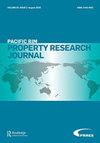Impact of entrepreneurship education programme (EEP) on entrepreneurial intention of real estate graduates
IF 0.3
Q3 Economics, Econometrics and Finance
引用次数: 27
Abstract
Abstract In the current socio-economic context of the “risk society” characterised by uncertainty and turmoil, entrepreneurship is one of the soft skills that is important among university graduates to ensure their survival in the real world. Realising that this skill can be taught and honed in professional undergraduate programmes, many universities have made entrepreneurship education a compulsory subject to improve undergraduate’s entrepreneurship skills. The discourse on entrepreneurship education programme (EEP) revealed a number of issues being discussed within conventional professional programmes such as engineering and management. Little is known about the impact of EEP on entrepreneurship intention within less popular professional programmes such as real estate. This paper provides an insight into how the compulsory entrepreneurship course impacts the entrepreneurial intentions of graduates of a real estate programme in a public university in Malaysia. Using a mixed method approach, a questionnaire survey and interview were undertaken to elicit respondents’ views about the success of the course in terms of instilling and shaping characteristics associated with entrepreneurship. Respondents were found to be less impressed with theory, and more influenced by real-life examples and experiences when emulating entrepreneurship behaviour.创业教育项目对房地产毕业生创业意向的影响
在当前以不确定性和动荡为特征的“风险社会”的社会经济背景下,创业是大学毕业生确保其在现实世界中生存的重要软技能之一。意识到这种技能可以在专业的本科课程中教授和磨练,许多大学将创业教育作为一门必修课,以提高大学生的创业技能。关于创业教育方案(EEP)的论述揭示了工程和管理等传统专业方案中正在讨论的一些问题。在房地产等不太受欢迎的专业项目中,人们对EEP对创业意愿的影响知之甚少。本文提供了一个深入了解必修创业课程如何影响在马来西亚一所公立大学房地产项目的毕业生的创业意图。采用混合方法,进行问卷调查和访谈,以引出受访者对课程在灌输和塑造与创业相关的特征方面的成功的看法。研究发现,受访者在模仿创业行为时,对理论印象不那么深刻,更容易受到现实生活中的例子和经验的影响。
本文章由计算机程序翻译,如有差异,请以英文原文为准。
求助全文
约1分钟内获得全文
求助全文

 求助内容:
求助内容: 应助结果提醒方式:
应助结果提醒方式:


